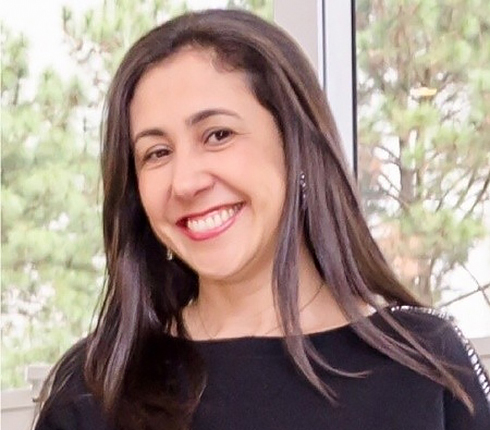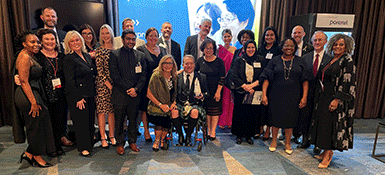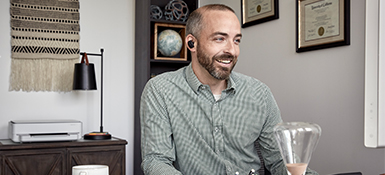Catia, Senior Director of Clinical Operations at Parexel Biotech
"Working in a global environment has challenged me as a leader and helped me develop the competency of learning new things quickly and teaching others."

Catia progressed from a Clinical Operations Leader to Senior Director, Clinical Operations, overseeing CRA Line Managers and Clinical Research Associates at Parexel Biotech in North America. Read about her career path, what she learned along the way, and how important support is. Finally, she discusses her core values that she holds dear.
Reflection on her career at Parexel
2008 - Catia started at Parexel as a Clinical Operations Leader
I became a Clinical Operations Leader at Parexel, tasked with overseeing a major project spanning eight countries in LATAM. Fortunately, I had a project manager who took me under their wing and mentored me when I first joined the project. After just over a year, I was promoted to project manager for LATAM. In 2009, my managers recognized my competence in people management and I was given the opportunity to manage the internal CRAs.
2010 – Transitioning to managing Clinical Operation Leaders
One of the most fascinating aspects of transitioning from project management to people management is the need for a complete shift in mindset. While project management is primarily concerned with delivering results, people management places greater emphasis on comprehending the requirements of the individuals carrying out the work. Initially, adapting to this change was difficult for me as I was primarily focused on delivering results. However, I gradually understood that I was not the main actor anymore, but I was preparing others to be the main actors, to let them take responsibility and let them shine. This realization was a major turning point in my career.
2019 – Moving to Parexel Biotech – Leading COLs in the Americas
In 2019, I applied for a position in the newly established biotech division and was appointed as the head of the COLs group in the Americas. This marked a significant shift as I had to oversee not only 10 major clients but more than 200 small clients, each with their unique perspectives and expectations. I had to quickly adapt and learn how to foster a positive work environment for the staff at Parexel Biotech. As a leader, I believe that I must have the ability to change and be flexible in new environments. In 2020, we encountered a new hurdle when the pandemic struck, and we had to adapt while the team still growing. At present, I oversee a team of almost 100 COLs, and the biotech division is continually evolving.
2024 – Leading CRAs and CRA Line Managers in North America
In July 2024 I moved to the Site Management Organization to take the role of Biotech Segment Head for different accounts/clients managing the CRA Line Managers in the USA. In addition, in September 2024 I started overseeing the CRA resourcing group for the North American region.
3 lessons learned from moving into people management
The importance of support
What support did you receive to progress within Parexel?
I've been fortunate to have had great leaders as my role models and mentors throughout my career at Parexel. When I was promoted to a senior manager position, my boss invested time in understanding my profile and finding new opportunities for me to develop myself. This happened again when I moved to a biotech role, where I had a mentor based in Europe, demonstrating the global nature of the company. Additionally, some wonderful women supported me when I had to start in new positions or take on new responsibilities in the same position. I have a strong leader managing me who is investing time in making her expectations clear, highlighting my strengths, and identifying areas where I need to further develop myself.
How do you support your team?
I lead a team of line managers, who manage Clinical Research Associates. I coach them to become more effective leaders and work closely with their direct reports to help them shine. Using the direct reports’ strengths and investing time in looking for opportunities for them to develop and move up in their careers. That could be within our Biotech group or another internal position. I have had several of my team members move up to Line Management, Quality & Risk Lead positions, and the Integrated Solution Group. Sometimes, they have skills and competencies that are better suited for other positions, and I am happy to see them migrate to these positions when they are ready to fly.
About Parexel's Core Values
Coming to an end with the interview, please share with us which Core Value at Parexel you stand behind the most.
The core value I like the most in our company is "patients first." It's our mission to help bring new treatments to patients. I’m especially proud of us for developing rare diseases and innovative treatments like gene therapy or cell therapy. Another core value that I find extremely important is "respect". It's crucial to have a work environment where everyone is focused on respecting each other in our daily work. This makes a huge difference.
Do you want to work with Catia?
Explore Parexel
Sign up for our Talent Community
Sign up and we’ll reach out with job alerts when positions that match your career interests become available. We’ll also share periodic updates about the latest company news and events.




